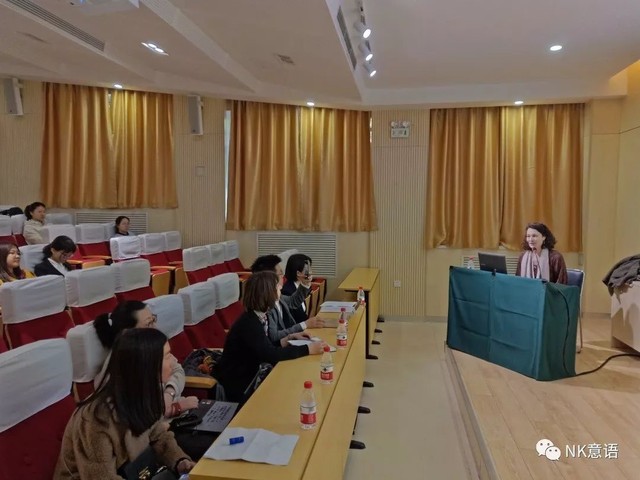
On April 25th, 2019, the lecture themed with “the Image of Russia in China in the 17th to 18th Centuries” was delivered by the sinologist Anna Di Toro from Università per Stranieri di Siena in the College of Foreign Languages. The lecture presided over by Ms Yang Lin, associate professor from the Italian Department, has attracted all the teachers and students from the Italian Department as well as some students from the Russian Department.
The lecture introduced the image of Russia in China in the 17th to 18th century from two aspects: the political philosophy of both China and Russia and the Jesuit missionary.
At the very beginning, he analyzed the political contacts between these two countries to compare their political philosophy, and found that the Autocratic Monarchy System worshiped by both tsarist Russia and the Qing Dynasty shared universal values and political ideology. Through his detailed introduction and analysis, we would figure out that the political system carried out by China along with the ethnic identity shared by the Chinese group was based on Confucianism, in which a lot of ideas held the belief that China was the world’s cultural and political center. However, the tasrist Russian’s political system was based on Orthodox, which believed that the Moscow principality shouldered the responsibility to unify the Christian world. In addition, Anna Di Toro found that the emperors were recognized as Messiah in these two countries’ political systems, and that both two China and Russia tended to decline towards isolationism in certain historical periods. He compared the messianism in these two countries by studying the ancient literature and cited what professor Yan Guodong had found in his research of the image of Russia in China. He then talked about the view change of the European world on China: from being pro-China to fearful of China. He also added that the Russians seemed to have been stuck in the anxiety of identity in cultural identity.
Then Anna Di Toro continued from the perspective of the Jesuit missionary. He listed a lot from books to make himself understood, for example, the violence of the Russians, the totalitarianism of the tsar, the dishonesty of the Moscow locals, the religions in Moscow principality, and some other amusing stories in the book Zhi Fang Wai Ji. He also emphasized that the image of Russia in Chinese people eyes was quite complicated and influenced by many other factors.
His lecture was so informative and humorous that many audiences were motivated to raise questions, which was answered by Anna Di Toro one by one. Furthermore, he said gathering intelligence and shaping national character were two motives for the rise of China Studies in the 17th to 18th century. He also suggested that, for the students who were learning a foreign language, it was really important to find what you like and devote yourself to it, to read more, and to make friends with those from other countries. And the lecture was concluded in view exchanges.



